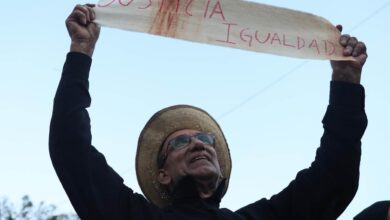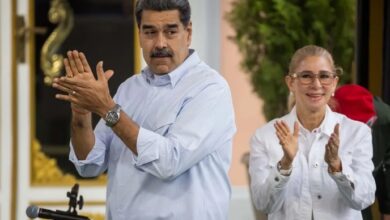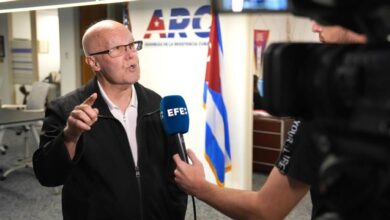These Are The most militarized governments in Latin America
To show more power than the constitution confers on them, heads of state and government may include several military members in some ministries to ensure loyalty in decisions that need majority support.

Photo: REUTERS
LatinAmerican Post | David García Pedraza
Listen to this article
Leer en español: Los Gobiernos más militarizados de LatinoAmérica
The military arm of a country is one of the most influential organizations since it consolidates the territory and sovereignty and protects the population of a nation, three fundamental elements for the formation of a State. Seeing him as a benchmark of power, it is not unreasonable to imagine the need to have allies with people who have been part of the national militia.
In public opinion, it is well seen that the portfolio of the Ministry of Defense, or War, is commanded by a reliable and prominent military officer who supports and advises the Head of State if national sovereignty is in danger and who can direct military forces with caution and precision. However, when a president surrounds himself mainly with the military in public office, it is considered a warning sign at the democratic level.
This situation is currently being experienced (and for several years) by the Executive in Venezuela, where President Nicolás Maduro oversees fourteen soldiers. In figures, 42% of the Venezuelan Executive power is in the hands of the active and retired military, which translates into the historical maximum number of uniformed men present in the ministries. These ministries are Defense, Foreign Relations, Mining Development, Housing, Transportation, and, most recently, Petroleum.
Thanks to a publication by the NGO Control Ciudadano in October 2020, the Venezuelan cabinet had 26% of portfolios in the hands of the military. In September 2021, it rose to 22%. In January 2023, it rose to 36%, and in just two months, it increased by 6%. What needs to be clarified is the little or no knowledge that some soldiers have according to the ministry they arrive at. However, Nicolás Maduro does not seem to care about this situation as long as his allies are in the correct positions.
How is the Panorama of Political Soldiers in Latin America?
With the course that various Latin American democracies have taken in recent years, of going from governments from left to right and vice versa, the military obeys the principle of fidelity, loyalty to the flag and to the head of State (which in the region is the same President of the Republic). For this reason, it is crucial to have the army present in government situations because there would be insurrection or military coups if there is no proper communication between the State and its armed hand.
However, this does not mean political soldiers should surround the State, and Latin America understands this situation well. It is typical for the Ministry of Defense to be commanded by a uniformed officer, as in Mexico. However, in countries such as Argentina, Brazil, Chile, and Colombia, lawyers, diplomats, and politicians occupy this position. Furthermore, these four countries, along with Bolivia, do not have any military or uniformed personnel in the presidential cabinet.
In the case of Guatemala, there is a soldier in the middle of the cabinet, while Nicaragua and Peru have two each. These nations also maintain low military involvement within their ministries.
One of the most notable cases of the number of political soldiers was that of Brazil under the administration of Jair Bolsonaro, a retired military man and former president of the most populous nation in Latin America. During his term from 2019 to 2022, he had seven active and past soldiers in his cabinet. After his presidential discharge, the current period of Lula Da Silva he has reduced military participation in forming the new Brazilian administration to zero.
It may interest you: Will the right be able to regain power in the elections in Latin America in 2023?
The Difference Between Left, Center, and Right is Foreign to the Military
In perspective, the Brazil of the past, on the right, and the Venezuela of the present, on the left, have had the uniformed within their closest circle in the Executive. From the outset, it could be said that there is no way to sentence that military power is used only by some current or political ideology.
The countries that have turned towards governments of the left and the center, such as Brazil, Chile, and Colombia, have lowered military participation in their cabinets. Even so, they know and understand that this armed force is of vital importance for the present and future of nations.
In the opposite case, where there was a turn from right to left, as in Nicaragua several years ago, the military image in politics intensified. The issue is very similar to Venezuela, in which, although the left has governed since Hugo Chávez, politics at the hands of the military has increased.
With the Executive posts granted to the military, the Venezuelan opposition and regional oversight may intensify to try to control and appease this situation. As with the separation of Church and State in the last century, the ancestor and the beginning of the current one, the heads of State and the population are aware of the democratic threats that exist when the armed forces have high participation in public issues.
All the actors are essential in a nation, from the citizen to the head of state. It is there where the principle of loyalty defended by the military must be noted with excellent appropriation value since this armed force has been created to protect an entire nation, regardless of the religion, political, economic, or social position that each individual possesses. The problem is when this principle is affected by the high command's orders, reaching such a point of ending that very nation that they were urged to care for.




